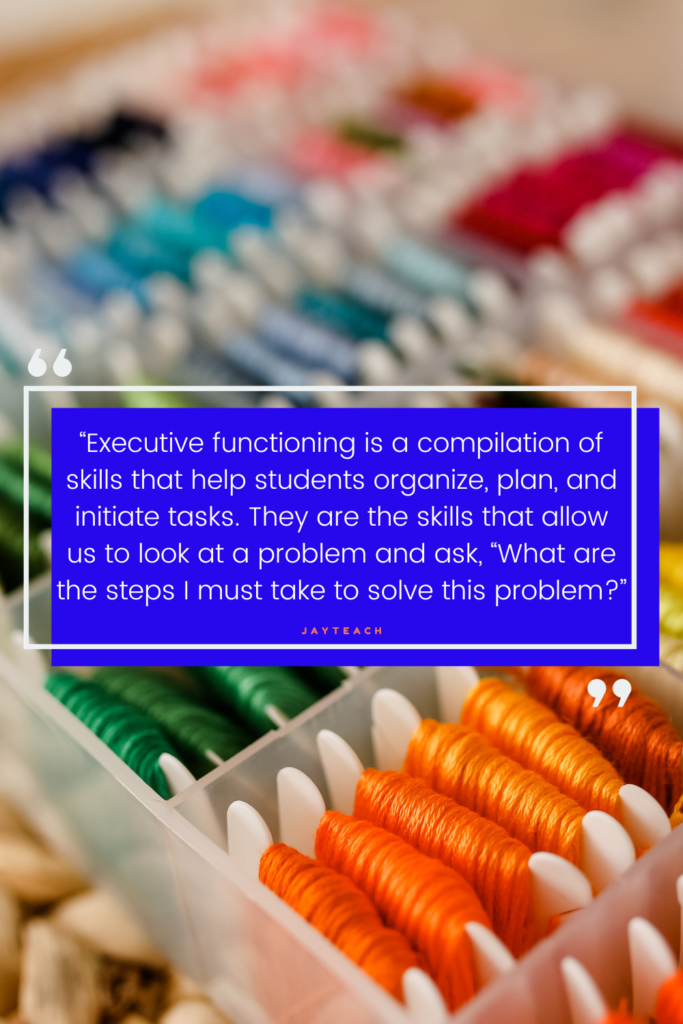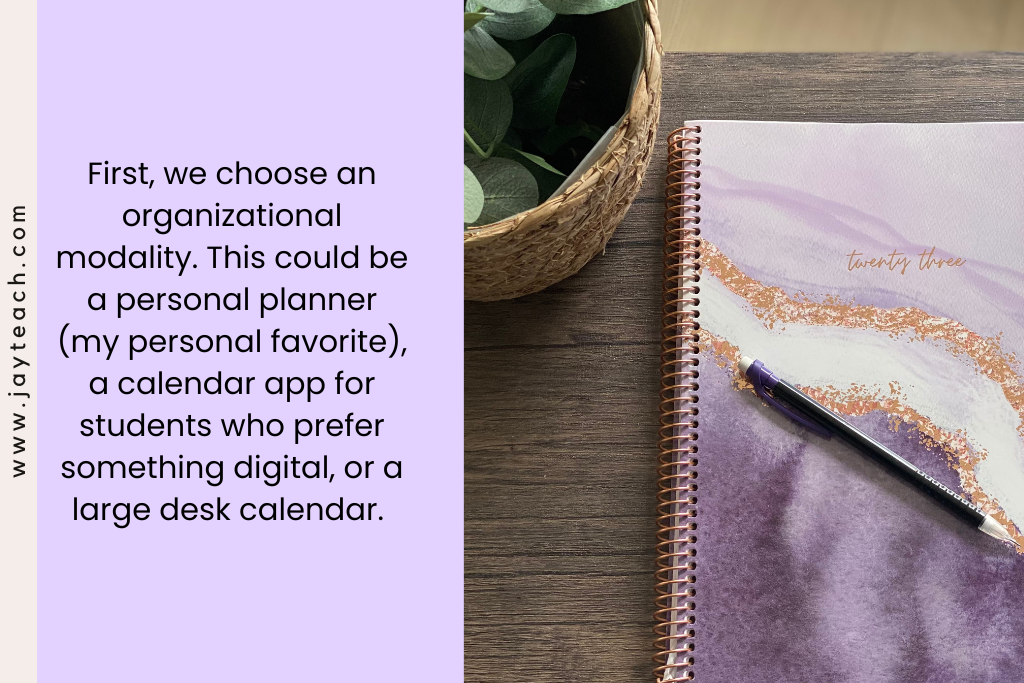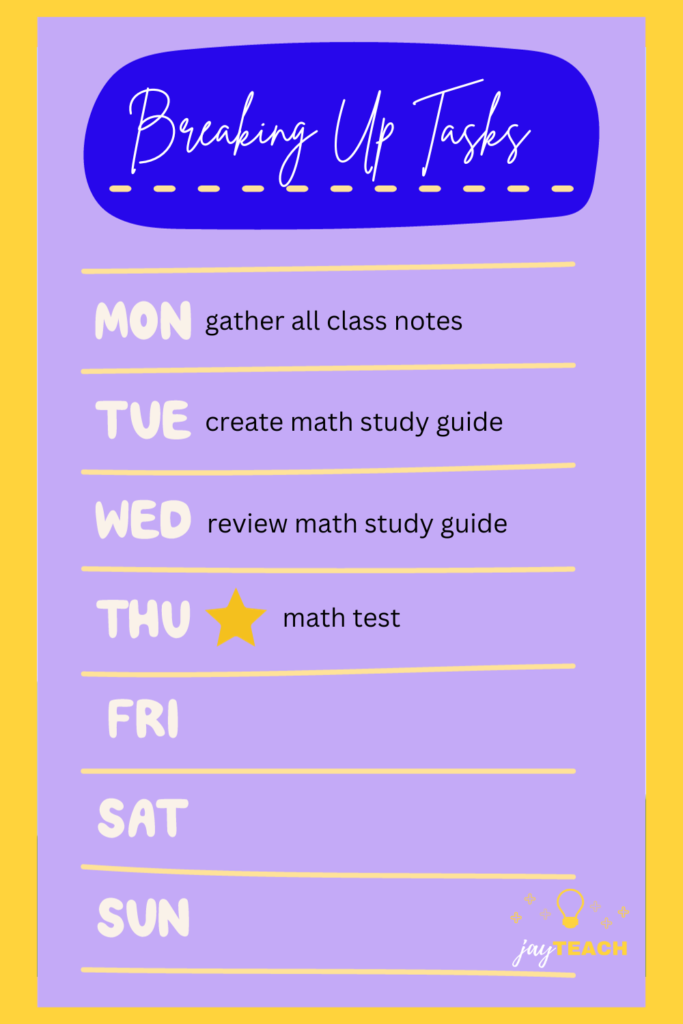As an executive functioning coach, I can honestly say that executive functioning skills are at the foundation of everything we do. While executive functioning is much more than just organizational strategies, today I will be focusing on how to help students develop ways to stay organized.
Picture this: your son comes home from school, throws his backpack on the ground, gets his favorite snack, and plops onto the couch.
“Do you have any homework tonight?” you say.
“Uhhh… I’m not sure.”
“Why don’t we check your planner?”
A few minutes later, you realize a few things: 1. Your son left his planner at school 2. He has a project due tomorrow and has yet to start it. 3. He has no idea what to do, so he continues to watch his favorite TV show.
I see situations like this all the time in my own practice. I am Jaymee: a certified teacher, learning specialist, college essay coach, executive functioning tutor, and founder of JayTeach. Feel free to check out my website for all things education! Every organizational strategy I discuss in this blog post is a method that I teach in my executive functioning sessions.
Before we get into the organizational tips, you might be wondering… what is executive functioning anyway?
What is executive functioning?
Executive functioning is a compilation of skills that help students organize, plan, and initiate tasks. They are the skills that allow us to look at a problem and ask, “What are the steps I must take to solve this problem?” From there, our brain is able to organize our ideas and develop a plan. For some, these skills come easily. For others, they need to be explicitly taught by someone like an executive functioning coach.

More specifically, executive functioning skills can be broken down into the following categories: completing tasks, creating goals, maintaining focus, monitoring emotions, initiating tasks, managing time, being organized, developing plans, and having self-awareness.
Now that you have a better understanding of executive functioning, let’s talk about specific organizational tips from an executive functioning coach that you can use with your students.
Organizational Tip #1: Implement a Weekly Planning Session
I get approached by frustrated parents who say things like, “Billy forgot another HW assignment. He also didn’t realize he had karate on Thursday and ended up missing it because he stayed at school for extra help.” While I wish I could be a fly on the wall for all of my students, tapping them on the shoulder and reminding them of that upcoming history test, I know it is much more effective to teach explicit organizational tools to set them up for success and independence. Teaching time management to students is crucial. Enter: the weekly planning session.
The premise is simple: teach students to implement a 10-minute weekly planning session to map out their responsibilities for the week. I recommend these planning sessions occur on Sunday evenings, but ultimately leave it up to my students to decide.
First, we choose an organizational modality. This could be a personal planner (my personal favorite), a calendar app for students who prefer something digital, or a large desk calendar.

Next, I model what a 10-minute weekly planning session looks like. I categorize my responsibilities into categories: personal and business. Of course, every student will have his or her own categories. Maybe it’s personal, social, school, or extra-curricular.
To take it a step further, I encourage students to create symbols for each category. Students write down their categorized responsibilities for the entire week. Mapping the week this way allows students to get a full picture of not only their school responsibilities but their week as a whole. They see how tasks coincide and where their busy days and not-so-busy days land. Simple, but effective.
Organizational Tip #2: Teach Students to Break Up Tasks
Now that the weekly planning session is underway, it is time to take a closer look at those tasks on your “to-do” list. Students often start by writing “math test” on whatever day of the week it might fall. My next question is: “What are your responsibilities that need to occur on the days leading up to that math test?” Typically, I am met with an, “Oh! I need to study for it.”
This leads to a conversation about breaking down a larger task into smaller, actionable steps. Yes, we can “study for a math test,” but how can we break that up? Our action plan looks something like this:

We also discuss why this technique is important. When we break apart tasks into more manageable pieces we are not only coming up with a study plan but reducing unnecessary stress and anticipation. It is a whole lot easier to “gather materials” and check that off the list than to ruminate on the impending test, telling yourself over and over, “I need to study for that!”
Organization Tip #3: Incorporate “Organization 101”
A child comes home from school and a parent says, “Where is your math homework? How come it isn’t in your math folder? ” The student replies with, “It’s in my backpack.” This leads to a problematic quest to find said math homework.
Rummaging through a backpack filled with an opened bag of chips, crumpled-up Post-its, a leaky water bottle, and a sea of stray pens. After what feels like hours of searching, the math worksheet is found– crumpled up in the side pocket of the backpack. Sound familiar?
What if I told you that organizational skills do not come naturally to most people? I repeat: organization skills do not come naturally to most people. These skills must be explicitly taught. Enter: “Organization 101.”
Whether teaching in the classroom, working one-on-one with students during an executive functioning coaching, or making recommendations to parents, I am a huge fan of dedicating weekly time to teaching organization.
This could look like teaching students how to properly store worksheets in a folder or binder, how to categorize materials into subjects, colors, or sizes, or how to use labels to eliminate unnecessary searching.
I hope these organizational tips have been useful. As I have mentioned, we need to teach children executive functioning skills explicitly. If your student could benefit from learning these skills, feel free to visit my website to learn more about how I can help.

Related Articles:

